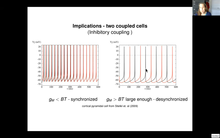The videos from Brain Day 2023 are now available on line at our youtube channel. Hope you enjoy.
Speaker: Leonard Maler (University of Ottawa)
Multiple Encoding Strategies and the Computational burden of Decoding for Perception
Sensory systems of vertebrates typically have to encode many distinct classes of signals emanating from conspecifics (communication), food sources, predators, and environmental features required for navigation (landmarks). Neuronal coding schemes associated with these signal classes include labeled line coding, spike rate coding, spike pattern coding, and population coding. Natural questions that arise are whether there is any connection between the various classes of sensory signals and the different coding types, and what neural dynamics might implement these encoding/decoding strategies. The electrosensory/motor system offers is a useful preparation to study such problems because it is relatively simple to define and mimic the natural signals associated with communication, prey capture and navigation. Behavioral studies have revealed that the fish responds to these signal classes and must therefore have the neuronal machinery for their encoding, perceptual classification, and decoding into motor activity. Presenting the fish with mimics of natural signals while recording spiking responses have allowed us to trace encoding transformations from electroreceptors to midbrain neurons. We find that many disparate encoding strategies are differentially used to encode signals associated with communication, prey detection and landmark recognition. Labeled line coding is generally not present at early sensory processing stages, but emerges in the midbrain as a result of code sparsening. At early processing stages various combinations of spike patterning, population coding and encoding via complex temporal sequences of spiking responses across a population are required to connect the electroreceptor responses and the final behavioral outcome of sensory stimulation.
200 University Avenue West
Waterloo, ON N2L 3G1
Canada







